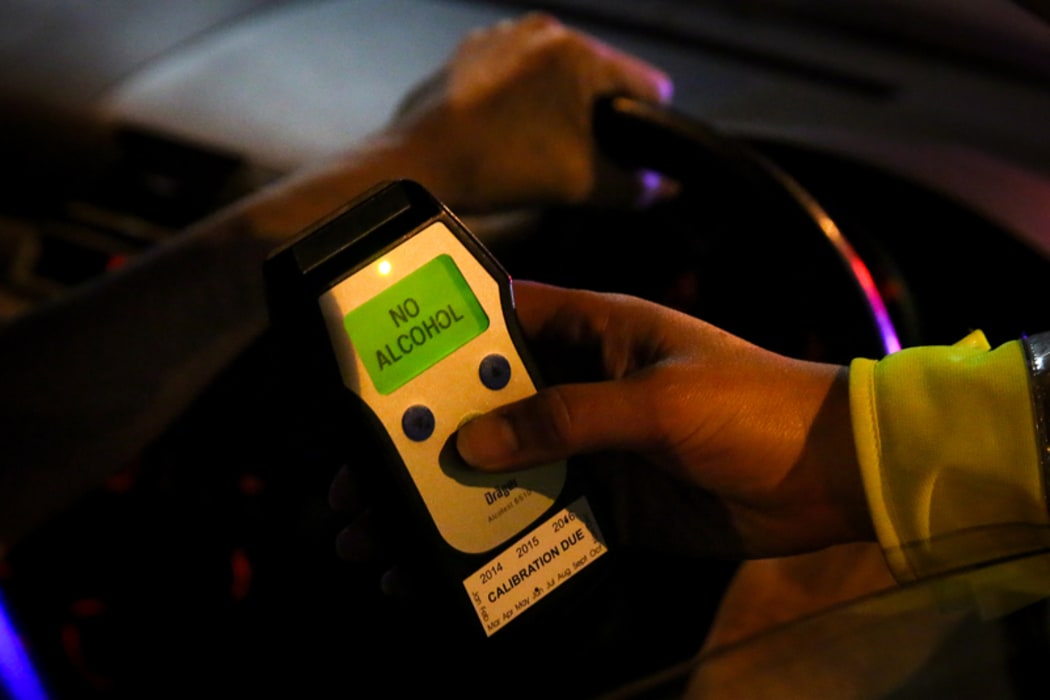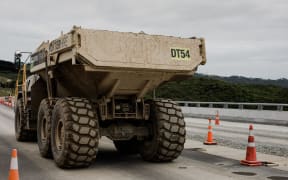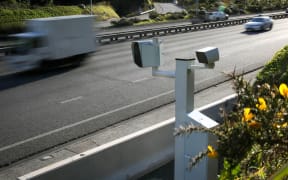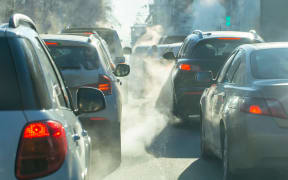More Aucklanders are dying or being maimed on the roads because police are doing only half what they said they would to tackle speeding and booze.

A police officer conducts a breath-test on a driver. Photo: RNZ / Alexander Robertson
An Auckland Transport report says the lack of breath testing and mobile speed camera enforcement is a "tragic failure" that is costing lives - about 10 a year it estimates.
AT's board has made boosting those levels its top road safety priority.
Police say they acknowledge they have significantly undershot the agreed targets, and promise to do better - "We are committed to improving this".
A year ago, AT's road safety team took stock, and got worried.
What they considered a "very very alarming" road toll in Tamaki Makaurau beginning in 2013, had turned for the good after 2017, but then U-turned again, and this year is in a "sharp upswing" - 47 dead, compared to 21 last year.
What was going wrong?
AT chief executive Shane Ellison brought back in an Australian consultant who'd given them 45 recommendations for improvement in 2018.
The resulting report has scored AT high for delivering on three-quarters of the work - but scored government agencies low, with half their work stalled or on go-slow.
"The efforts of central government have not been adequate to achieve reductions in death and serious injury that most other developed countries have delivered," the report said.
"This situation has made the task of improving road safety outcomes much more difficult for Auckland."
'Dropped the ball'
Police were funded to do about 800,000 breath tests last year but did only half that.
"This is a tragic multi-year failure to deliver agreed deterrence through agreed breath testing to reduce annual fatality levels," the report said.
"Currently the price paid for extensively redeploying road police and compromising planned enforcement is additional drink-driving and speeding-related fatalities... each year - in the order of some 9 to 11 lives."
Police used mobile speed cameras for only 16,800 hours, against a target of 30,000 hours (international best-practice, for the city's population, would suggest 60,000 hours).
AT chief executive Shane Ellison got a heads-up on these figures early this year, and began asking why.
He wrote to police and the Transport Agency Waka Kotahi in March.
"Clearly... at that time, there was a lesser appreciation [by police] about the role of general deterrence, the role of mobile deterrence, in... addressing road trauma," Ellison told RNZ.
"New Zealand is out of step with international best practice.
"New Zealand's dropped the ball" with its policy and the regulatory frameworks around speeding and drink-driving", he said.
"We need to do better."
What has changed since?
Ellison said he got an "immediate" and "positive" response from police and NZTA.
Police had begun what is called Operation Deterrence, to focus more on road safety - the report directly links fatalities to the diversion of road police to general duties - and had become more open.
"We now are getting far better visibility of police performance than what we have done in the past."
However, the report, endorsed by AT's board, also questions other agencies' capabilities.
"Likely that MoT [Ministry of Transport] does not have resources to address available measures to save many NZ lives annually," it said.
The minister needed to be made aware of the need to use mobile covert cameras "extensively" in urban areas, it added.
This - coupled with high fines and demerit points for being snapped going 7 percent above the speed limit - would "dramatically and substantially reduce Auckland fatalities".
'There has been a lot of work done'
Increased levels of enforcement both by speed cameras and police patrols are meant to be integral to the government's Road to Zero strategy launched two years ago. Covid has delayed its rollout.
The pandemic also led to fewer breath tests than expected in Auckland last year - 1.4m were done between 2017 and 2020.
But police said they "acknowledge that Covid-19 has only had a small impact on our overall performance".
"Police acknowledges that our performance around breath testing and speed enforcement could have been better in previous years and we are committed to improving this with our road safety partners moving forward," road policing boss Superintendent Naila Hassan said.
"While police has not met the targets outlined in the Road Safety Partnership Programme, this should not be seen that police has not been targeting those who are drinking driving or speeding.
"There has been a lot of work done in this space," she said.
"Police are committed and will continue to focus on general and specific deterrence ... and will continue taking the appropriate prevention and enforcement action to reduce death and serious injury."
Hassan first agreed to an interview but then pulled out, saying she was too busy, and instead issued a lengthy statement.
Waka Kotahi declined an interview.
It says it has communicated its expectations to police around delivering on the targets.
The Ministry of Transport says it is reviewing road safety investment, focusing on infrastructure and road policing.
The police will soon have still more on their plate: Next year they are due to begin drug-driving tests, aimed at doing 30,000 nationally a year.
The report urges AT to back police to get extra staff to do this.






